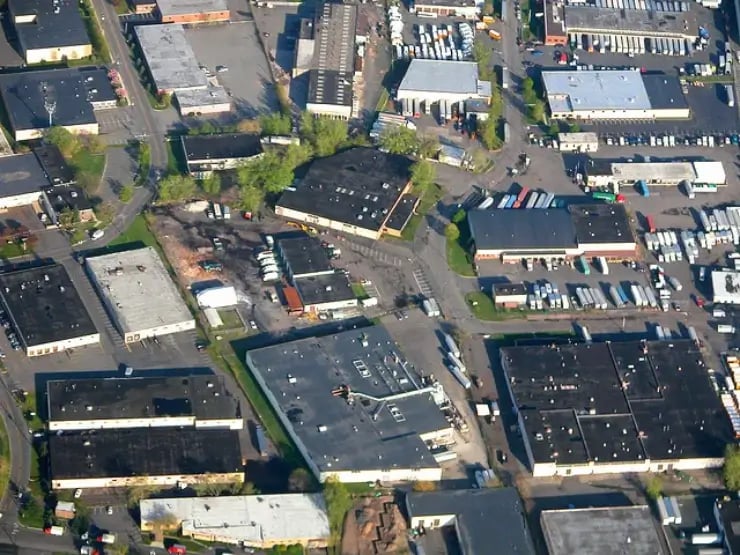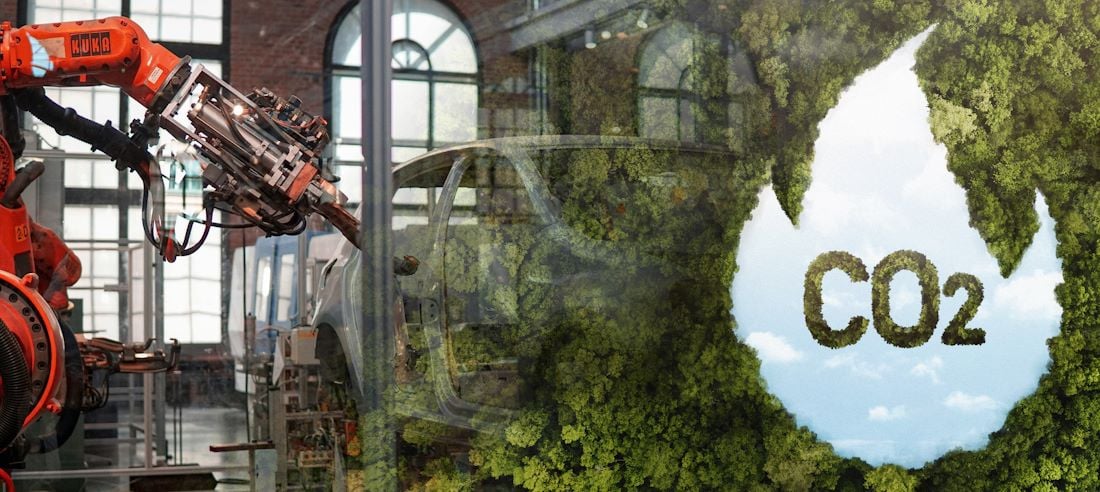Buy local, drive less, switch to renewable energy – these are just a few of the omnipresent suggestions for reducing greenhouse gas emissions at the personal level. By no means do I aim to discredit their significance, but it strikes me that they are pushed just everywhere, whereas measures on other levels are hard to find. Pragmatic ideas to improve an individual company’s climate bills are less visible in the media, even if they do shape most of this blog. Nevertheless, be it in this blog or elsewhere, you hardly ever read anything about reducing the emissions in an entire industrial or commercial park. Now that’s surprising, if you consider the huge savings that can come with multi-plant collaboration. Strangely, when thinking about reducing climate-related emissions from industry and commerce, most observers have only one production plant or one office in mind even though there are a number of measures that are more cost effective and more climate relevant when a whole industry, park, and neighbors pull together. So what we need is a look beyond the factory fence, and that’s exactly what Angelika Paar, Martin Pehnt, Jan Bödeker and Nils Thamling had in mind when they wrote a report about collaborative climate protection measures in industrial and commercial parks. Their report was published in August, 2012, and it forms part of Germany’s “Masterplan 100% Climate Protection” (original title: “Industrie- und Gewerbeparks – Klimaschutzmaßnahmen im Unternehmensverbund”). In this article, you’ll find a summary of the most effective measures contra global warming and pro cost reduction, plus ways to achieve them.
Here we go. Note that there is a weird framework that hinders corporate collaboration: despite the fact that most of Germany’s industrial parks have been around since the dawn of the 1960’s, almost none of companies in them have made any effort to get to know their neighbors. This is one of the conclusions the authors of the report drew after analyzing a survey of companies in industrial parks in Rheinland-Pfalz, a region in Germany bordering France. Neither employees nor executives said they bother to maintain relations with neighboring companies. That should definitely change. Not only would it benefit the environment, but it would also provide an increased degree of synergy. Especially for services that are outsourced anyway, like energy supply, waste and wastewater management, street or rail connections, and production plant maintenance – all of which would be more efficient if they were centrally coordinated.
The report showcases the ZeroEmissionParks interregional project concept, which is a model of cooperation. At the heart of the project sits a coordinator called a zero emission consultant whose job is to unite the various companies and the relevant delegates from the local municipality. The idea is for the consultant to provide companies with concrete, cost-effective measures at the beginning of the project that motivates them to provide detailed data and to take part in continuous workshops. It also helps a lot to display carbon emissions savings both locally and online using something called an Emission-O-Meters. During the course of the project, with a gradually rising level of confidence, the project’s scope gets more detailed. It starts with a more general assessment of emission data for the entire park and, little by little, following 10 standardized steps, it implements optimizations of material flow management in the individual companies and creates better, holistic energy management. One industrial area mentioned is in Bottrop, in the Ruhr area, and it could save 35% of its climate-related emissions by 2020 simply by refurbishing its building stock for energy efficiency, capturing waste heat from wastewater streams and production plants, generating compressed air efficiently and fixing pressure leaks, using all suitable roof space for photovoltaic solar power generation, and saving drinking water by installing rainwater capturing systems.
Another industrial area that is also part of the ZeroEmissionPark-network, is in Kaiserslautern and it, too, could save 35% of its emissions. The set of needed measures includes a heating and cooling network powered by a central cogeneration plant. Extending photovoltaics to the maximum feasible and improving water management are two more things the energy managers in Kaiserslautern need to put in place.
In Bremen, a third park showcased by the project could achieve emission cuts reaching 31% through building renovations, efficient lighting, photovoltaic solar power and the use of rainwater.
To guarantee constant improvement, so say the authors, it is essential to have a professional institution managing the park. The cost for this management is then shared among the companies present.
The authors mentioned the typical issue of ineffective structures caused by the ever present human fascination for the new. Even though most of existing industrial and commercial parks have enough space to match slowly increasing demand, new parks are still founded, creating additional traffic as well as inefficient land and infrastructure use. Better and more strictly applied spatial planning that includes analysis of gaps between buildings in existing parks could resolve the issue.
In the Netherlands, a policy to redevelop commercial parks has been put into practice and mandatory professional park management is included.
The report concludes with an extensive recommendation for how to design an industrial park management subsidy that has the ultimate goal of cutting all possible greenhouse gas emissions. Explaining it goes beyond the scope of this article, so let me conclude by mentioning a best practice from possibly the greenest commercial park in the world.
As a pioneer that shows how things should run, the authors pointed to an industrial area in Austria called Hartberg. In the middle of the 1990s, the local municipality started to attract green businesses and create synergies by providing carbon neutral energy for HVAC and electricity. One company, Ökopark GmbH, provided all services. Heat and electricity is centrally supplied through a combination of a biogas powered sterling motor, a biomass plant, photovoltaics, and a wind turbine. Ecologic waste and wastewater management as well as the use of rainwater make the park more consistent with natural cycles.
Further Reading
- Masterplan 100 % Klimaschutz: Industrie- und Gewerbeparks – Klimaschutzmaßnahmen im Unternehmensverbund . Bericht im Rahmen des Vorhabens „Wissenschaftliche Begleitforschung zu übergreifenden technischen, ökologischen, ökonomischen und strategischen Aspekten des nationalen Teils der Klimaschutzinitiative“ . Angelika Paar, Dr. Martin Pehnt, Jan Bödeker (ifeu – Institut für Energie- und Umweltforschung Heidelberg ), Nils Thamling (Prognos AG ) PDF Link
- Ökopark Hartberg: www.oekopark.at (in German)
- Zero Emission GmbH: www.zeroemissiongmbh.de (in German)
- Project Homepage with contact details at Institut für angewandtes Stoffstrommanagement (IfaS): www.stoffstrom.org/projekte/land-und-bund/zero-emission-park (in German)
Article image taken by Doc Searls (CC BY SA 2.0), showing an industrial area in Moonachie, New York. Well no, is has nothing to do with the ZeroEmission Parks, but yes, it does indeed look neat.





